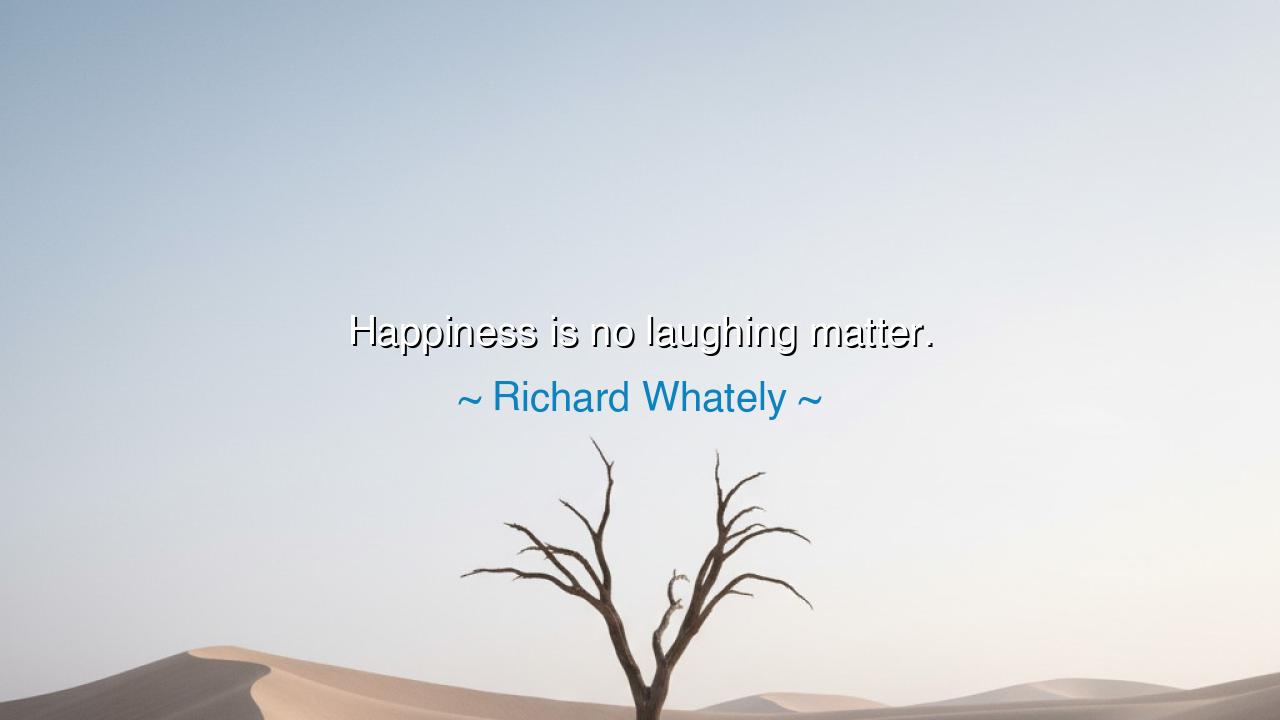
Happiness is no laughing matter.






The words of Richard Whately — “Happiness is no laughing matter.” — at first glance seem to contradict themselves. For laughter, lightness, and mirth are what many believe define happiness. But Whately, a scholar and theologian of the 19th century, spoke not of shallow joy, but of the deep and solemn happiness of the soul — a joy rooted not in fleeting pleasure, but in inner harmony, purpose, and virtue. In this brief, paradoxical statement, he invites us to look beyond the surface of delight and recognize that true happiness is a sacred pursuit — one that demands reflection, integrity, and wisdom.
Whately lived in an age of reason and reform, when faith and intellect often wrestled for dominance. As Archbishop of Dublin, he observed how easily people mistook amusement for contentment, and how often laughter was used to mask emptiness. He saw that many pursued pleasure as if it were the same as peace, but the two are not the same. Pleasure is the spark that flares and vanishes; happiness is the steady flame that endures through darkness. His words remind us that genuine happiness — the kind that nourishes the heart and gives meaning to life — is not a mere accident of circumstance, but the reward of a life well lived.
In calling happiness “no laughing matter,” Whately does not condemn laughter, but rather honors the gravity of joy. For true happiness, he teaches, is a serious labor of the soul — a state achieved through patience, discipline, and moral clarity. It requires one to look honestly at oneself and the world, to face suffering with courage, and to find peace not in distraction but in understanding. The ancients, too, spoke of this. Aristotle described happiness, or eudaimonia, as the highest good — the full flourishing of human nature through virtue. To be truly happy, one must cultivate the mind, temper the passions, and live in harmony with what is just. This is no easy or frivolous task; it is a noble calling.
Consider the life of Viktor Frankl, the Austrian psychiatrist who endured the horrors of the Nazi concentration camps. In that abyss of human cruelty, where laughter was scarce and comfort nonexistent, he discovered a truth akin to Whately’s. He wrote, “Those who have a ‘why’ to live, can bear almost any ‘how.’” His happiness — if such a word can be used — was not born of pleasure, but of meaning. He found in suffering the seed of purpose, in despair the spark of defiance. Frankl’s joy was not the laughter of ease, but the serene strength of the soul that knows it is free even in chains. His life embodies Whately’s insight: that the deepest happiness is solemn, resilient, and sacred.
This understanding demands that we treat our own pursuit of happiness with reverence. Too often, modern life mistakes comfort for joy, excitement for fulfillment. We chase entertainment to avoid silence, success to mask insecurity, and indulgence to dull the ache of emptiness. But such happiness fades, and when it vanishes, we are left hollow. Whately’s words call us back to seriousness — not to solemn gloom, but to the quiet discipline of gratitude, compassion, and truth. For it is only when we stop laughing at happiness as a trivial thing that we can begin to live it as a divine one.
The ancients would have understood Whately’s wisdom. The Stoics, like Seneca and Marcus Aurelius, taught that happiness is born from mastery of the self. To them, the happy man is not the one who laughs the loudest, but the one who remains tranquil amid storms. Such peace is not shallow or simple; it is forged in the fires of struggle and understanding. In the same way, Whately reminds us that happiness must be earned — not bought, not begged, not stumbled upon, but cultivated through right living and noble thought.
So let us take this teaching into our own lives. Do not chase happiness as though it were an object, nor dismiss it as mere amusement. Seek instead the happiness of depth — the joy that arises from integrity, love, and purpose. Take time each day for silence and reflection. Be grateful not only for pleasures but for challenges, for both shape the soul. Laugh, yes — for laughter is good — but let it spring from contentment, not from distraction.
And remember Whately’s truth: “Happiness is no laughing matter.” It is the crown of a life well-lived, the harmony of heart and mind, the peace that endures beyond pleasure. Treat it with reverence. Build it patiently, like a temple of the spirit. For the one who pursues true happiness with sincerity and courage does not merely laugh at life — he understands it, and through that understanding, becomes whole.






AAdministratorAdministrator
Welcome, honored guests. Please leave a comment, we will respond soon